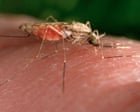
Recent weeks have seen several pivotal developments across the globe, presenting both challenges and opportunities in the realms of public health and environmental management. From recurring health issues to legislative changes and recurrent weather disturbances, these events reveal the intricate balance of nature and human activity.
In Zimbabwe, a resurgence of malaria has been identified as a pressing concern. Despite considerable efforts over the years to control this mosquito-borne disease, the recent withdrawal of critical funding from the United States has led to an alarming increase in cases. Health experts report a significant rise in malaria outbreaks, with 115 incidents recorded in 2025 compared to just one the previous year. The cessation of US support, which had been instrumental in funding research and providing resources such as mosquito nets, is seen as a contributing factor to this troubling upturn.
Shifting our focus to South America, Brazil has found itself at a crossroads with the passing of a controversial environmental bill within its legislature, colloquially known as the “devastation bill.” This new legislation aims to drastically reduce the environmental safeguards that have been in place for decades, paving the way for increased deforestation. Among its most vocal critics, are over 350 organizations and social movements advocating for environmental preservation and the rights of Indigenous communities. The bill, posing a significant challenge to conservation efforts, is now awaiting either approval or veto from the President of Brazil within a 15-day period, a decision that could have lasting environmental impacts.
Meanwhile, South Korea contends with natural challenges as torrential rains batter the country. Continuous heavy rainfall over several days has unfortunately resulted in the loss of lives and left thousands disrupted and unable to return home. As authorities maintain vigilance, they have issued warnings across the nation due to the heightened risk of landslides and flooding, with expectations for the rain to persist in some regions until early next week. In demonstrating resilience, communities and officials are coming together to offer support and mitigate further risks.
Elsewhere, environmental commitment takes center stage in the UK. The government has pledged to tackle the full spectrum of water pollution across England and Wales. This initiative comes amid alarming data indicating a 60% increase in serious pollution events involving water companies. The Environment Secretary, Steve Reed, emphasized that tackling sewage spills is just one part of a broader strategy to reduce pollution from various sources, including agricultural and roadway runoff. This announcement sets important targets for policy and action in maintaining cleaner waterways and safeguarding public health.
In France, there is a semblance of relief, as efforts to manage wildfires near Martigues have seen success. Thanks to the diligent work of around 300 firefighters, the blaze was brought under control after a relentless 24-hour operation. While the fire is now contained, vigilant efforts continue through the night to extinguish any remaining hotspots, highlighting a proactive and swift response in ensuring public safety and environmental protection.
These global stories vividly illustrate the diverse challenges countries face in balancing human impact with environmental stewardship and public health. They serve as a potent reminder of the need for effective collaboration and resource allocation to safeguard our planet and its people for future generations.
Source: {link}
